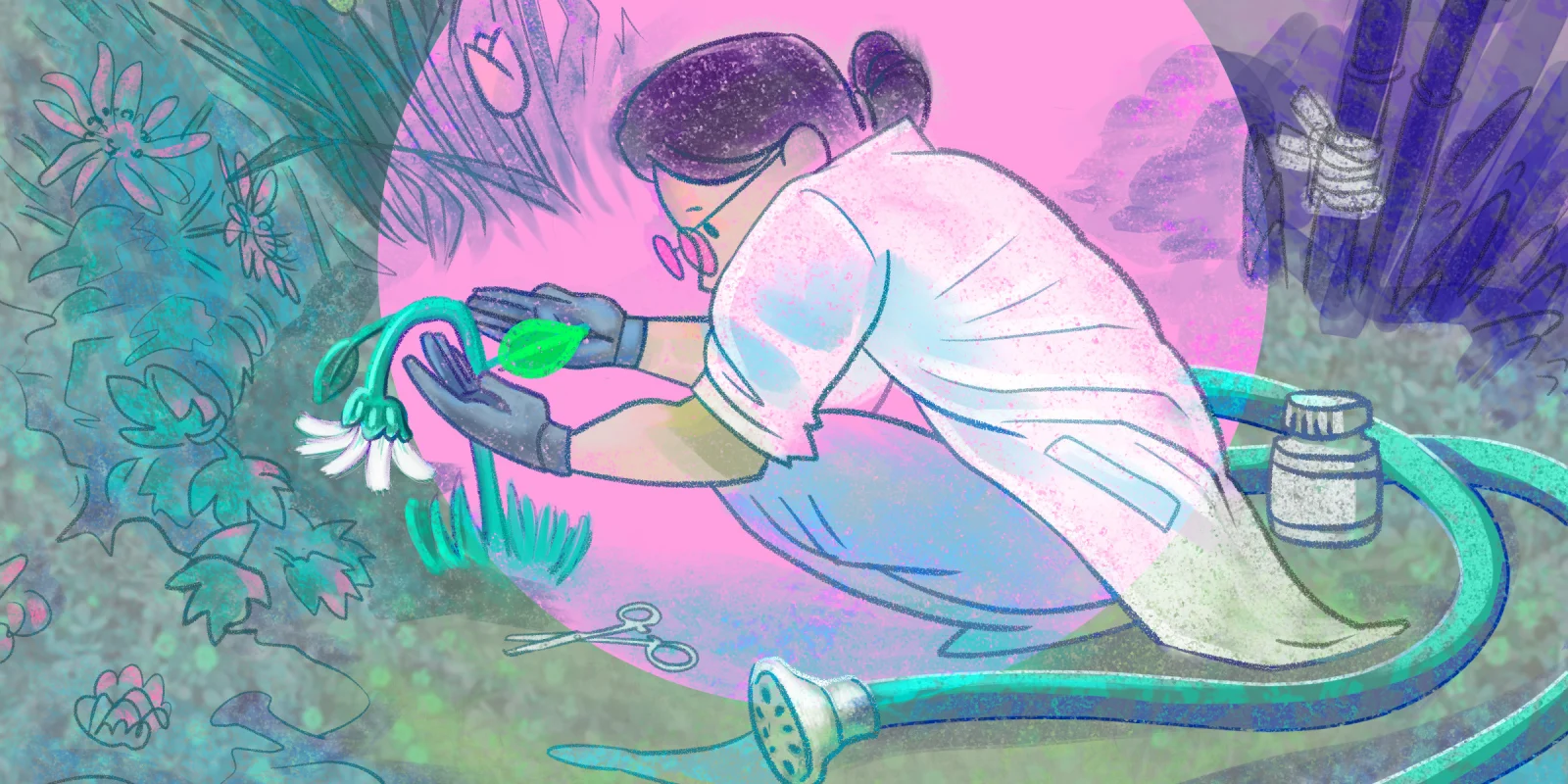A garden: 1,000 square feet of Washington soil defined by a simple concrete border. I’m certain that when my grandparents created the garden in the late 1950s, they had no idea that it would become a powerful metaphor for my life. A few years after he built that garden, my grandpa would tragically lose his ability to talk and work as a result of a complicated brain surgery. Those strong and defined boundaries outlining their garden would contain what would go on to sustain him and his family for decades by growing fresh vegetables and beautiful flowers, as well as housing a few whimsical garden gnomes.
This garden has served as a clarifying metaphor — that by creating space and having hearty boundaries, what is truly important to me can thrive. For some, such boundaries do not need to be as sharply defined or adhered to. In my case, however, the consequences of not honoring them can be potentially staggering.
I was diagnosed about 10 years ago with a form of bipolar disorder. My diagnosis was undetected for years, as the highs of my unique brain chemistry often took the form of achievements and accolades. Periods of working night shifts while remodeling a house during the day or writing successful grants in short periods of time had escaped being labeled as disordered. Such episodes were often camouflaged by the many roles we take on as physicians, especially as women.
However, it became quite apparent after the birth of my first child that my depression was the bottom of a sine wave that had been building in amplitude over the years. It was devastating to my family and me the degree to which depression almost took everything.
Fortunately, through great care and support, I emerged from this depth with stability and hope that has since sustained me, for which I am entirely grateful. What went on in my life the years following was much like the creation and maintenance of my grandparent’s garden: I had to start with my perimeter.
I became committed to things that were healthy for me, such as regular sleep, an intentional schedule, managing stress, meditation, exercise, medication, healthy diet, therapy, connecting with my support system (especially my awesome husband), and spirituality. These are the concrete borders of my garden.
Focusing on my health gives me the energy and passion for the good stuff — my family, faith, and friends, my patients, and my creative pursuits. I love raising my children, volunteering, experiencing nature, and creating simple art that brings me joy. This perimeter around my health keeps me stable, providing the produce that nourishes me.
My borders once seemed restrictive. Now they bring me power. They allow me to show up. They illuminate what is important. My borders bring me life.
For years, I was keenly aware that many of my colleagues had more margin than me; they could recover quicker if stressed. I saw it as an advantage — they were able to live differently, more freely, as a result of not having a mental health diagnosis. But eventually, I started noticing many of them sacrificing vital aspects of their lives and becoming burnt out over time, an experience that is becoming an epidemic in medicine. I now feel like I am the one, surprisingly, who has the advantage. Being bipolar has empowered me to set healthy boundaries early in my career and given clarity in defining them. Being bipolar has taught me to engineer my life in such a way that it cultivates what I need. Paradoxically, I feel I can be more generous with what I have to give by having what I need.
These experiences, along with consistently checking my internal compass, led to the fulfillment of a dream to start my practice. My virtual clinic is a culmination of how I want to practice the art and science of psychiatry and has blossomed while continuing to honor those trusty concrete borders. Creating my practice has provided much-needed stability and balance for me. I might see fewer patients than some of my colleagues, but I’m able to care for them in a way that I can take pride in and feel gratitude for. This is only possible because of the permission I have to care for myself.
My garden represents many years of building borders to protect my health, and now I cultivate it daily. I no longer feel shame for my diagnosis or what I need to be healthy nor feel like I was given a short straw. Bipolar disorder has given me the conviction and vision necessary to flourish, which has made me a better wife, mom, friend, artist, and physician for it.
With physicians experiencing the privilege and stress of caring for so many in a pandemic, it can take a toll, especially on our mental health. I want to share my journey to show a perspective of practicing medicine and managing a mental health diagnosis. I believe positive outcomes of wrestling with a serious mental illness should be shared, even if anonymously. I hope my story helps break down the stigma of mental illness for physicians, normalizes taking care of our needs, and allows us to be human.
Although my grandparents are no longer living, they left a legacy. My hope is that the small garden I am tilling in my life, and the gardens that we are all tilling with our lives, will offer produce to others that is sweet and life-giving. And perhaps, someday, somebody will even notice the quirky garden gnomes.
The author is a board certified psychiatrist and founder of a virtual psychiatry company offering care in six different states. She loves, in addition to her family, belly laughs, good music, nature and tea with real cream.
Illustration by April Brust






